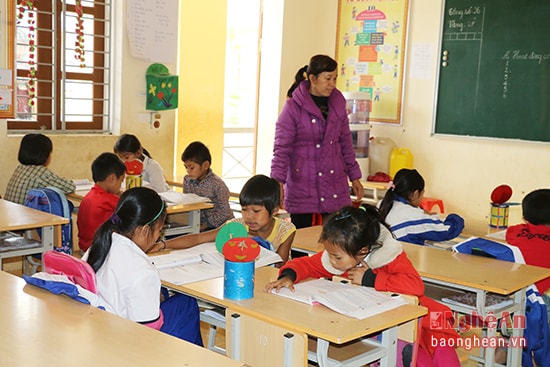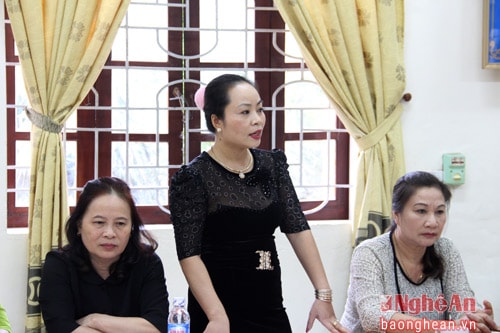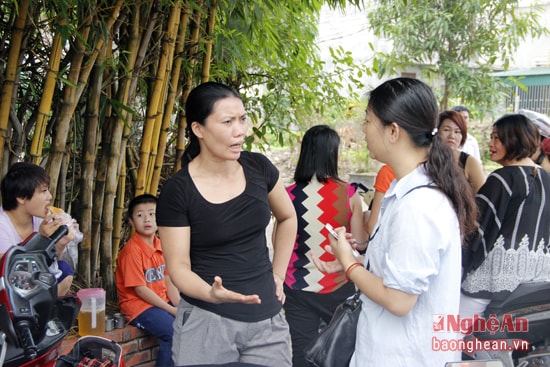VNEN School in Nghe An: All kinds of problems
(Baonghean) - Due to the lack of thoroughness in surveying local conditions and steps to implement teaching and learning according to the new VNEN school model, when implementing, Nghe An as well as some other provinces have encountered opposition from many parents and public opinion. The Education and Training sector needs to frankly acknowledge and objectively evaluate this issue in order to have solutions and recommendations for reasonable and effective adjustments.
>>>VNEN in Nghe An: Some praise, some criticize - Why?
Identify the cause
After a period of implementation, the new VNEN teaching model has encountered strong reactions from parents. It is clear that the first reason is the weakness in the propaganda and dissemination of policies to all people, including teachers and parents.
In any field or issue, to implement a new task, first of all, the implementers and direct beneficiaries need to know, understand, discuss and debate thoroughly, then it can be successfully implemented. The relevant units and individuals need to clearly understand the roadmap and nature of that policy and guideline in order to have an appropriate attitude, monitor, inspect, even support, assist or jointly resolve difficulties and make suggestions for adjustments.
In Nghe An, it can be seen that the authorities, especially the Education and Training sector, have not paid much attention to propaganda, leading to not only parents but also many teachers not clearly understanding the policy and implementation roadmap.
 |
| Teaching under the new school model at Yen Na 1 Primary School (Tuong Duong). Photo: My Ha |
Ms. Nguyen Thuy Lam, a parent of a student in Vinh City, said: “Actually, I don’t know much about the new teaching and learning method. I heard the teacher say that this model has many advantages, the children often sit in groups to discuss and study. When I saw on social networks and in the press that there was a stir about the imbalance between studying and taking exams, I asked the teacher, and she said she wasn’t sure, she only knew that it was currently being piloted, and it was not known whether it would be implemented or not after the pilot phase.”
A parent named Loc Thi May, village 3, Huu Kiem commune, Ky Son district, whose son is studying in grade 3 under the new school curriculum, honestly said: “I do not know what program my child is studying. I only heard the school say that they are studying this program, the teacher guides, the students study by themselves. But here, if we tell them to study by themselves, it will only be a game. Their studies are getting weaker and weaker!”
Talking about the incident at the beginning of the 2016-2017 school year, parents of some classes at Le Loi Secondary School, Vinh City, objected to the application of the new model, Principal Vo Hoang Ngoc said: “I directly attended meetings with classes whose parents objected to this model and asked them if they knew anything about the new school? What is teaching and learning like in the new school?... Some people were silent, some shook their heads, some said they didn't know much. After I explained and gave examples to help them understand how teaching and learning in the new school model is, how students will benefit, and what difficulties the school is currently facing, what needs to be added to better serve teaching and learning in this model, the vast majority of parents who objected before now have no comments and are reassured about their children's learning.”
 |
| At the beginning of the 2016-2017 school year, representatives of parents of students at Nguyen Trai Secondary School expressed concerns about the quality of their children's learning when studying under the VNEN model. |
The reason why parents of some schools object is partly because they do not clearly understand the nature of the problem, combined with public opinion causing anxiety and worry that their children's education will be affected.
However, many parents have a clear awareness and understanding of the nature of the problem and recognize the shortcomings and obstacles in the process of implementing the new school model in Nghe An, especially the limitations in facilities and teaching equipment; the qualifications of the teaching staff do not meet the requirements.
At Nghia Binh Secondary School, Tan Ky District, classes in grades 6 and 7 apply the new school teaching method, but the classrooms are too small, with 4 rows of desks and chairs placed close together with only 1 aisle in the middle. The classrooms were all built in the 1980s and 1990s and are old and degraded, so it is impossible to rotate desks in groups.
In addition, the number of students is too high, such as in class 6A there are 39 students, class 7B has 30 students, so Ms. Nguyen Thi Hong - homeroom teacher of class 7B at Nghia Binh Secondary School confided: "In 1 period, I cannot guide and monitor all students, cannot comment on each student according to regulations". Or like Le Loi Secondary School (Vinh City) with 45 students/class, monitoring and giving specific instructions to each student in each period is an extremely difficult task for teachers, which will affect the quality of students' learning.
At Hung Dung Secondary School, Vinh City, in the 2016-2017 school year, 91.8% of parents of grades 6 and 7 also wrote a petition to the school and related levels and sectors to protest against teaching according to the new school curriculum because of "lack of essential facilities, textbooks, lack of teachers and lack of confidence in students' results". After 2 years of pilot implementation, this is also the 3rd time the school's parents have made this petition.
Due to the large number of students, managing students in groups takes a lot of time, so lessons often run out of lesson plans - this is the reflection of many teachers at schools in Nghi Loc, Yen Thanh, Tan Ky districts, Vinh city...
Implementing the new teaching method, the class size is maintained at only 20-25 students, under the responsibility of 2 teachers. However, in Nghe An, the arrangement of teachers according to the staffing level of 1,2 has not been thoroughly implemented; many schools have to sign additional contracts or teachers have to teach extra hours, increasing the work intensity, causing fatigue and overload. In addition, due to the large number of students, the lesson plans are "burned out", many teachers have to arrange extra tutoring in the lessons outside of the main class hours.
Through the sharing of teachers, it shows that the problem does not lie in the teaching method, but in the inappropriate application conditions. Speaking more about this issue, Ms. Duong Thu Ha - Principal of Hoang Ta Thon Secondary School, Yen Thanh District, said: To meet the requirements of teaching according to the VNEN model, teachers do not have to prepare lesson plans but need to spend a lot of time outside of class hours to prepare carefully, from knowledge content, to teaching aids and other auxiliary equipment, not to mention having to supplement their own skills, the art of leading, provoking, and conversing so that students are open and confided in teachers.
They are willing to do so because of their love, responsibility for their students and passion for their profession. But it cannot be denied that many teachers feel tired and worried when the efficiency is not high; moreover, not 100% of the teaching staff have met the requirements of teaching new methods, some are afraid of change,...
Not to mention that for secondary school level, piloting new methods but no longer having financial support, because the project only supports funding for piloting at primary level, including textbooks. As a secondary school teacher in Vinh city said, "we carry out the task with empty hands".
Another reason that many teachers have reported is that the training, knowledge provision, and skills guidance for teachers to approach the new method are too superficial. At the central level, teachers are taught the change in method in 4 days, then the Departments of Education and Training deploy it to school clusters in 2 days.
Teacher Quynh Anh (Le Loi Secondary School, Vinh City) said that 2 days of training is too short, causing teachers to only have time to read and absorb the theory, while practice is just "riding a horse to see the flowers". The lack of textbooks also causes many difficulties in teaching and learning. Because the lessons in the reformed textbooks have full instructions for vivid practice steps, specific in the amount of knowledge.
The textbooks of the new school program are “3 in 1” integrated books, used for teachers, students and parents. The requirement of the new teaching method is that there must be interaction between teachers, students and parents to achieve the lesson objectives. However, most parents do not understand the curriculum framework, so when guiding and tutoring their children to study, it will lead to misdirection and incorrect knowledge content. Not to mention that according to the new school curriculum framework, 1 teacher is responsible for teaching 3 subjects in 1 such as: Literature - History - Geography, Math - Physics - Chemistry;… which is also a factor that causes overload and pressure because of limited capacity, moreover, they have only been trained in depth in one subject.
Because of these shortcomings, the school, teachers, parents and students are passive in the implementation process. At Yen Na 1 Primary School, Yen Na Commune (Tuong Duong), although it has entered the 5th year of implementing teaching and learning according to the new school model, according to teacher Nguyen Van Thanh - Principal of the school, students still do not have enough books to study. The school's ability can only provide students with textbooks which are old books left over from previous years. As for exercise books, in theory, parents should buy them, but here they do not have the ability...
A few years ago, many teachers saw the disadvantages of students studying without workbooks and spent their own money to buy them for their students. However, because they could not collect money for books from parents, teachers were not interested this year. Not to mention the debt of over 20 million VND from previous years to the Department of Education for books that has not been "recovered".
At Huu Kiem Primary School, Ky Son District, teacher Dao Cong Quang - Principal of the school also admitted: In a school with 6 separate locations, the majority of students are Thai, Khmu, with limited awareness and Vietnamese language ability, imparting knowledge to students according to the new school model is quite difficult. He also frankly said: This year we continue to implement the new school model because we want to take advantage of the project's textbooks from previous years. With the current economic conditions, parents are completely unable to buy new books according to the current program for their children. However, this is only a temporary solution. Furthermore, in the next few years, the school's board of directors has not yet imagined what form the new school model that the school has pursued for many years will take when the textbooks and classrooms supported by the project are old, damaged and cannot be "taken advantage of" anymore.
New models should not be replicated.
The above shortcomings have occurred during the 5 years of piloting the new school model in the area. Have the management staff and those in charge of the Education and Training sector noticed it? After 5 years of piloting, have the Department of Education and Training and the schools piloting the new school model organized a substantive and specific assessment, summary, and review of each implementation content? Are there any specific solutions to remove and overcome the obstacles and difficulties that affect the quality of teaching and learning according to the new method? A pilot model still has many opposing opinions among teachers and management staff of the Education and Training sector, especially the "harsh" reaction from parents, why is it still being deployed and expanded?
 |
| Parents shared with Nghe An Newspaper reporters their concerns about the VNEN model. |
According to teacher Vo Hoang Ngoc - Principal of Le Loi Secondary School, Vinh City, "This is truly a revolution in education reform. To achieve victory, it is necessary to meet all necessary and sufficient conditions. Only when we receive the consent, support and participation of the entire political system from the Central to the local level, down to each individual official of the Education and Training sector, as well as teachers and parents of students... In general, it is the participation of the whole society. Therefore, localities and educational institutions that do not have enough conditions should not implement it yet. In training human resources and fostering human resources, we cannot be subjective or hasty.
Given the current situation, the new VNEN school model should not be replicated in Nghe An. Investment should only be focused on schools that have effectively applied this new teaching method, to gradually improve the quality of teaching, in which the most important thing is to ensure adequate teacher staffing, professional training, renovate and upgrade classrooms, and invest in teaching equipment. This is also the recommendation of most of the "insiders" who are implementing the new school model in Nghe An.
On August 18, 2016, Minister of Education and Training Phung Xuan Nha issued Official Dispatch No. 4068/BGDDT-GDTrH on the implementation of the new school model from the 2016-2017 school year to the Departments of Education and Training and related units, stating: 1. Encourage educational institutions that are implementing the new school model to continue implementing it on a voluntary basis, ensuring practical effectiveness and maintaining it throughout the entire school level for the benefit of students. 2. For educational institutions that do not apply the new school model, some positive elements of the new school model can be selected to supplement the current educational innovation, ensuring the principle of taking student learning activities as the center. 3. Direct educational institutions to continue to proactively research, innovate and create in teaching and learning organization; apply other advanced educational models suitable to practical conditions; at the same time, carry out propaganda work well, create consensus among parents and public opinion to achieve the goal of fundamental and comprehensive innovation in education and training. |
PV Group
| RELATED NEWS |
|---|








